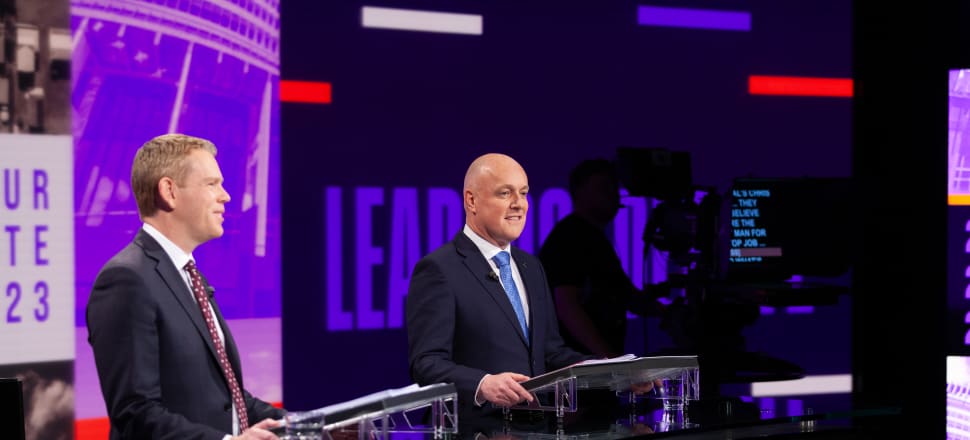
Televised debate revealed more similarities than differences between the two Chrises and shed very little new light on what makes the pair tick. Political editor Jo Moir was in the audience.
In the quickfire questions at TVNZ’s leaders’ debate on Tuesday night it was hard to find something the two men vying to be the next Prime Minister disagreed on.
They’re both against decriminalising cannabis, making vaping prescription only, becoming a republic and a wealth tax, and they’re both in favour of four-year terms, bilingual road signs and building names, and keeping nuclear-powered ships out of New Zealand waters.
They also both bought houses in their early 20s – Christopher Luxon was 24 and Chris Hipkins was 22 (he said 24 in the debate but clarified it in his press conference afterwards).
And on what they’re doing personally to help with climate change they both said they recycled and had an electric vehicle.
READ MORE: * Luxon and media playing game of hide and seek * Hipkins brushing up his messages - and memory
Luxon noted his wife’s Tesla was “probably the most famous EV in the country” and “as a family we embraced recycling some time ago, about a decade ago”.
The country’s kerbside recycling was introduced in the early 1990s, so not the earliest embracer, although he may well have been working offshore until the period he mentioned.
Hipkins went at Luxon over climate change and questioned why he was against policies Labour had implemented in government to reduce emissions, when over three consecutive years emissions had dropped.
He pointed out it made little sense from someone who “likes outcomes”.
Both leaders were asked one thing they’d do to ensure the country was a better place for New Zealanders in a decade’s time.
Luxon chose ensuring there’s a world-class education system, while Hipkins opted for his party’s free dental care policy for under-30s.
The fieriest part of the debate was when the issue of co-governance was raised, specifically how they defined it, and how parties would deal with Māori issues.
Hipkins repeatedly questioned Luxon as to why he thought he knew more about Māori health than Māori do.
When Luxon spoke of unwinding the Māori Health Authority under his government because it has created two systems, Hipkins questioned whether he also didn’t believe in Māori health providers.
Luxon shot back that he strongly believed in Māori health providers, and that was who should do the job, but under the umbrella of one health system.
“Having a Māori Health Authority isn’t having two separate systems,” Hipkins replied.
“It’s no different to having Māori heath providers and non-Māori health providers.
“Christopher says he’s in favour of Māori health providers, but he doesn’t think there should be a Māori Health Authority, what’s the difference?”
Luxon said by Māori, for Māori was a “great system and we invented it in the National Party”.
Speaking to media afterwards he clarified that what he meant to say was that National was a “big supporter of it” and his comments were in the context of when National was last in government.
Asked what they deplored in themselves, Luxon pointed to being a bit too full on and “hard charging” while Hipkins said he could do a better job of delegating.
Law and order were also well traversed, and both were asked whether they’d ever felt unsafe in New Zealand.
Hipkins said “obviously not at the moment” (presumably due to the diplomatic protection he receives as Prime Minister) while Luxon said he had walked in downtown Auckland in the evening, and it hadn’t felt safe.
The only topic that raised new insight was the issue of whether they’d ban fizzy drinks as part of a war on sugar.
Luxon said he believed education was more constructive than a ban on fizzy drinks.
Labour hasn’t released its full education policy this campaign, but Hipkins let part of it slip early when he said if re-elected his government would ban fizzy drinks in secondary schools.
They’re currently banned in primary schools.
Both committed to not making any funding cuts in health or education.
While the debate was very much about National and Labour, there were one or two mentions of Act and New Zealand First that slipped through.
“With all due respect, Winston Peters and David Seymour will be running circles around you,” Hipkins quipped.
He went on to warn Luxon, with a hint of first-hand experience, that New Zealand First leader Winston Peters brought “chaos wherever he goes”.
On most topics Luxon managed to get the last word in, even if moderator Jessica Mutch-McKay had already moved onto the next question, but on the whole, both were pretty polite in letting the other have their say.
They both admired the other for taking on the difficult leadership position they were in and the time they committed to their families, despite the demands of the job.
The leaders next face each other in a week’s time, where undecided voters will hope to learn something new.







